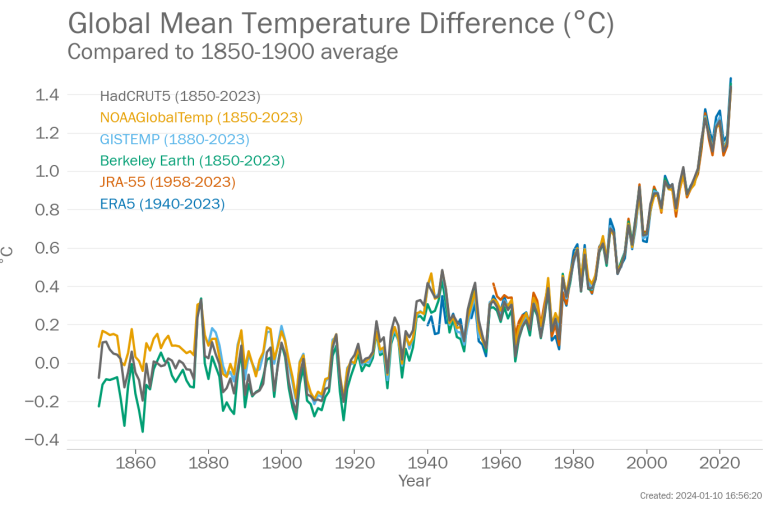WMO: 2023 is the warmest year in history

The World Meteorological Organization (WMO) has officially confirmed that 2023 will be by far the warmest year on record. The global annual average temperature approached 1.5° Celsius above pre-industrial levels - a symbolic figure, as the Paris Agreement on climate change aims to limit the long-term temperature increase (averaged over decades and not over a single year like 2023) to a maximum of 1.5° Celsius above pre-industrial levels.
Key messages of the WMO report
- Global average annual temperature in 2023 1.45 ± 0.12 °C above the pre-industrial level
- The world is moving ever closer to the limits set out in the Paris Agreement
- El Niño combines with climate change to fuel the heat in the second half of 2023
- 2024 may be even warmer
- Record heat is accompanied by enormous socio-economic effects
Six leading international data sets used to monitor global temperatures and consolidated by the WMO show that
- the global average annual temperature in 2023 was 1.45 ± 0.12 °C above the pre-industrial level (1850-1900)
- New monthly temperature records were set in every month between June and December.
- July and August were the two warmest months since records began.
Biggest challenge: climate change
"Climate change is the greatest challenge facing humanity. It affects us all, especially the most vulnerable," said WMO Secretary-General Prof. Celeste Saulo. "We cannot afford to wait any longer. We have already taken action, but we need to do more, and fast. We need to drastically reduce greenhouse gas emissions and accelerate the transition to renewable energy sources," she said.
El Niño phenomenon could make 2024 even hotter
"The shift from a cooling La Niña to a warming El Niño by mid-2023 is clearly reflected in last year's temperature rise. Since El Niño usually has the biggest impact on global temperatures after it peaks, it could get even hotter in 2024," she said.
"While El Niño events are a natural phenomenon and recur from year to year, longer-term climate change is increasing, and this is clearly due to human activity. The climate crisis is exacerbating the crisis of inequality. It affects all aspects of sustainable development and undermines efforts to fight poverty, hunger, disease, displacement and environmental degradation," said Prof. Saulo (Argentina), who became Secretary-General of the WMO on January 1, 2024.
Warmer every decade since the 1980s
Since the 1980s, every decade has been warmer than the previous one. The last nine years have been the warmest since records began. The years 2016 (strong El Niño) and 2020 were previously classified as the warmest since records began, at 1.29 ±0.12°C and 1.27 ±0.12°C above pre-industrial levels.
Based on the six data sets, the ten-year average for 2014-2023 was 1.20 ±0.12 °C above the average for 1850-1900, taking into account a certain margin of uncertainty.

Source: WMO
Foretaste of a catastrophic future
"Humanity's actions are scorching the earth. The year 2023 was just a foretaste of the catastrophic future that awaits us if we don't act now. We must respond to the record-breaking temperature rise with ground-breaking action," said UN Secretary-General António Guterres.
"We can still prevent the worst of a climate catastrophe. But only if we act now with the necessary ambition to limit the global temperature rise to 1.5 degrees Celsius and ensure climate justice," he said in a statement.
All records broken
The long-term monitoring of global temperatures is only one indicator of the climate and its change. Other important indicators are greenhouse gas concentrations in the atmosphere, ocean warming and acidification, sea level, sea ice extent and the mass balance of glaciers.
The WMO's preliminary report on the state of the global climate in 2023, published on November 30, shows that records have been broken in all areas.
Sea surface temperatures were exceptionally high for much of the year, accompanied by severe and damaging heat waves in the ocean. Antarctic sea ice extent was the lowest since records began, both for the minimum at the end of summer in February and for the maximum at the end of winter in September.
These long-term climate changes are reflected in our weather on a daily basis. In 2023, extreme heat affected health and contributed to devastating forest fires. Intense rainfall, flooding and rapidly intensifying tropical cyclones left a trail of devastation, deaths and huge economic losses in their wake.
Global temperature records in July are due to climate change






